Thekchen Chöling, Dharamsala, HP, India - Almost 500 Tibetan opera performers and their supporters met His Holiness the Dalai Lama in the Tsuglagkhang courtyard today. They belonged to 14 groups who are attending the Sho-tön, the annual opera festival, at the Tibetan Institute of Performing Arts (TIPA). Singing and dancing vigorously on either side of the aisle through the courtyard, Tashi Shölpa and Gyalu dancers welcomed His Holiness as he emerged through the gate to his residence. He walked steadily to his seat on the veranda below the temple, his right hand keeping time to the rhythm of the drums.
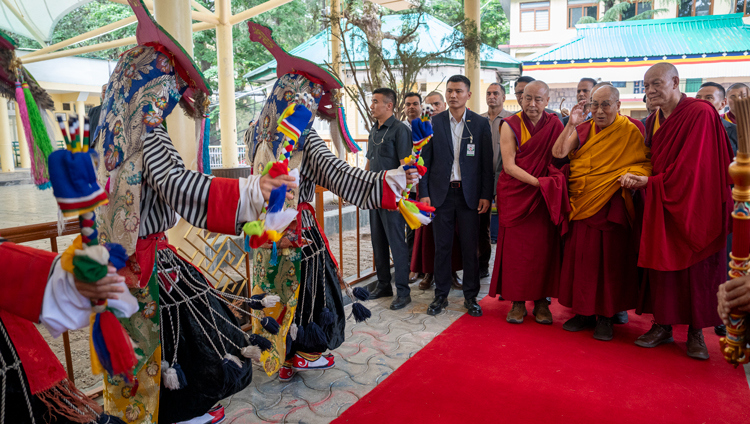
Dhondup Tsering, Director of TIPA offered a mandala and representations of the body, speech and mind of the Buddha. He presented TIPA’s annual written report to His Holiness and gave a short introductory talk.
“Since you were born in Tibet, the teaching has spread around the world. You are the compassionate one, Avalokiteshvara, may you live long. This year, which marks your 90th birthday, we’d like to present a series of songs from the Lhamo operas as part of our offering to you.”
Each of the opera troupes had two minutes to perform a song. In each case, one singer stood up to the microphone and took the lead, their soaring, emotionally stirring voice prompting a chorus in which the entire gathering took part, filling the courtyard with song.
Students from the Tibetan Children’s Village (TCV) Chauntra sang about offering incense from juniper trees that grow behind the monastery, its fragrance reaching the heavens. Students from Upper TCV, Dharamsala, declared they would sing to show that the sun in the east will shine more brightly and times will be happier in the coming year.
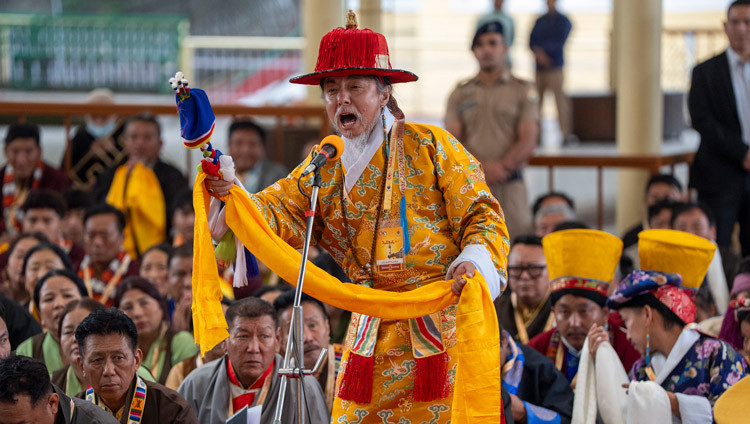
The song by students of the Tibetan Homes Foundation Mussoorie noted how fortunate we are that the Omniscient One is seated on the throne and a joyful sun shines on the world. Members of the Kollegal troupe gave a short presentation of the life of the Buddha. The Bylakuppé troupe’s performance came from the Lhamo opera Drowa Sangmo and referred to two friends sitting together comparing their dreams.
Performers from Paonta chanted a short prayer for His Holiness’s long life, then sang about the snow-lion that has long been parted from its native mountains. Members of the Mundgod troupe paid their respects to His Holiness. In their song they wished that beings from all six realms of existence be freed from suffering and reach liberation. The group from Bhandara repeated the lines about the Omniscient One seated on the throne and the sun shining on the world.
Artistes from the Chaksampa troupe based in the USA sang a couplet praising prostration to the Lamas and offerings of song to the Sages.
Members of the troupe from Odisha addressed His Holiness and proclaimed, “You are an emanation of Avalokiteshvara, the leader of Tibet. May the sun of happiness shine and may you live long.” They were followed by singers from Kalimpong.
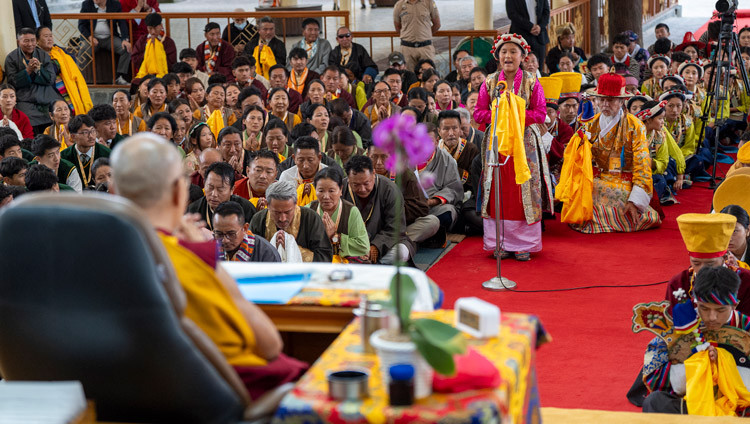
The troupe from Mainpat wished His Holiness good health and sang the last two lines of the one verse prayer for his long life:
“Tenzin Gyatso, Lord Chenrezig
May you live until the cycle of existence comes to an end.”
The verse sung by artistes from Nepal offered prostration to the Lamas and paid homage to the Three Jewels. Finally, members of TIPA wished His Holiness “Tashi Delek” and sang words of farewell while praying to meet again next year.
“Your songs and dances have reminded me of times at Norbulingka,” His Holiness told the gathering. “You’ve brought back vivid memories of how I used to sit in my room and watch the Lhamo performances outside. And as I watched I would imitate the dancers’ movements.
“Those were happy times, but all that’s changed. However, our Tibetan spirit remains as firm as a mountain. When I visited China, I had a strong sense that I came from the Land of Snow. This is something I can’t forget. I bear the title Dalai Lama, which indicates the responsibility I had for Tibet’s spiritual and temporal affairs.
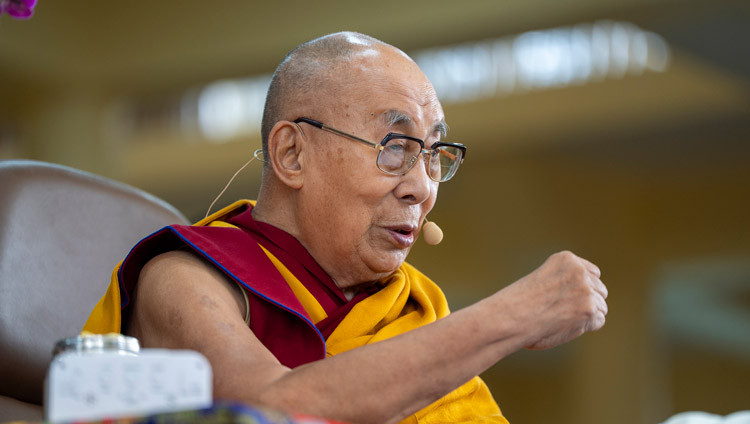
“As I say, when I was in China, I was strongly reminded that I am a Tibetan. Mao Zedong complimented me, but I didn’t try to flatter him—I observed him carefully. He told me that Tibetans were strong, dedicated, sincere, stable people. I think these qualities reflect Tibetans’ unflinching spirit.
“On my way to China I passed through Do-tö and Do-mé where people expressed their respect for and faith in the Dalai Lama. Wherever I met Tibetans, I would teach them. I felt very moved to have this opportunity and the people listening to me shed tears too, reflecting the strong bond that exists between them, the teaching and the Dalai Lama. This kind of dedication has existed since the time of King Songtsen Gampo. We have had special links with the Chinese, but, at the same time, a strong sense that we are Tibetans.
“Our dedication to our cause is strong and unwavering and we find this spirit, this strong sense of identity, among Tibetans wherever they are, whether in Tibet, India or elsewhere.
“Regardless of the current situation, I am confident that ultimately our struggle will produce a positive result.
“As someone who bears the title Dalai Lama, I don’t just pay attention to political affairs, I also take psychology into account. My main practice is to cultivate love and compassion, as well as the view of emptiness, but my brain also has room for science—this is something scientists admire. We can explore Buddhist psychology, understanding of the workings of the mind and emotions, with reason and logic. As a consequence, when Mao praised me, I was able to listen and be quietly critical of what he said and his views.
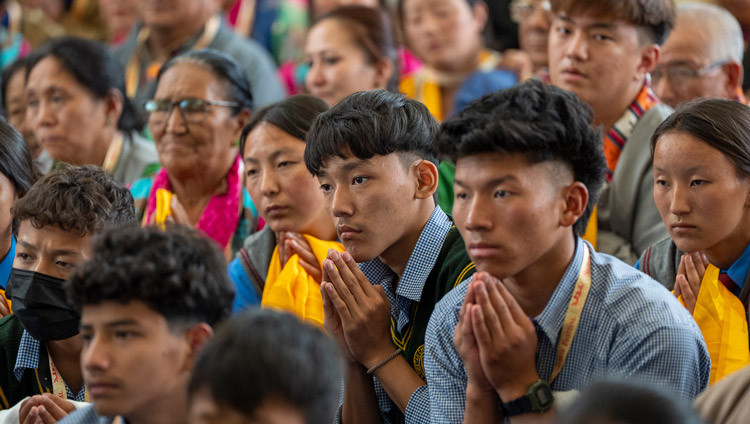
“Tibetans of the three provinces have maintained their identity. In their hearts, their view and conduct remain the same. Like them, I am determined to keep our Tibetan spirit, culture and religion alive. The explanations we have of the Perfection of Wisdom are powerful. The way we examine them logically means they can be compared to and combined with modern studies.
‘This profound heritage has come down to us from the religious kings. We have kept the traditions they introduced alive. Tibetan practitioners and scholars have preserved them. And because they deal with psychology, they’re timeless. That’s all I have to say. Tashi Delek.”
Every one of the Sho-tön artists then lined up to file past His Holiness and receive his blessings. When that was done, His Holiness climbed into a golf cart to ride back to his residence. The entire congregation sang for him as he passed by:
“Tenzin Gyatso, Lord Chenrezig
May you live until the cycle of existence comes to an end.”
They concluded with a line about how joyful it is to see His Holiness the Dalai Lama, and they continued to sing for some time after that.












